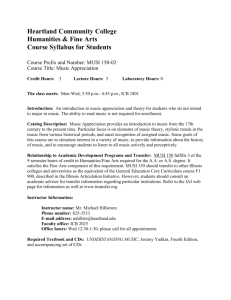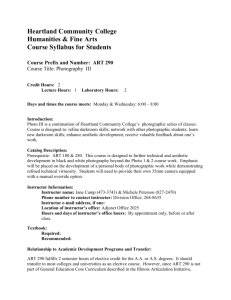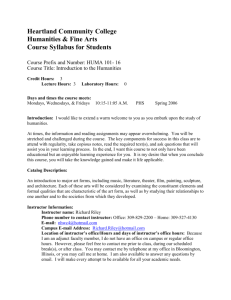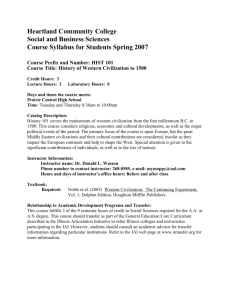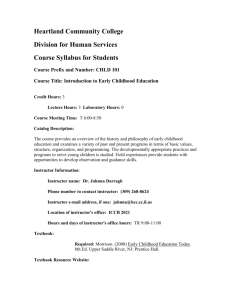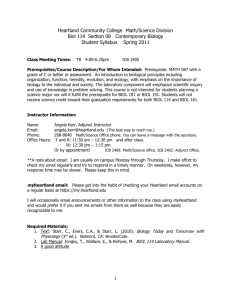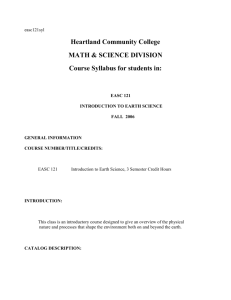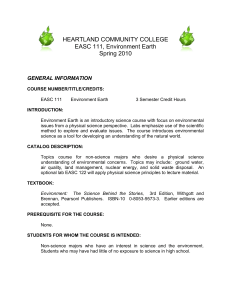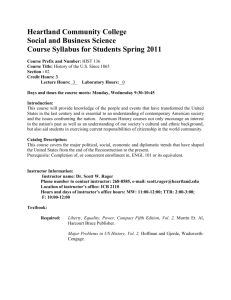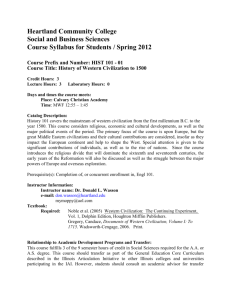Instructor: - Heartland Community College
advertisement
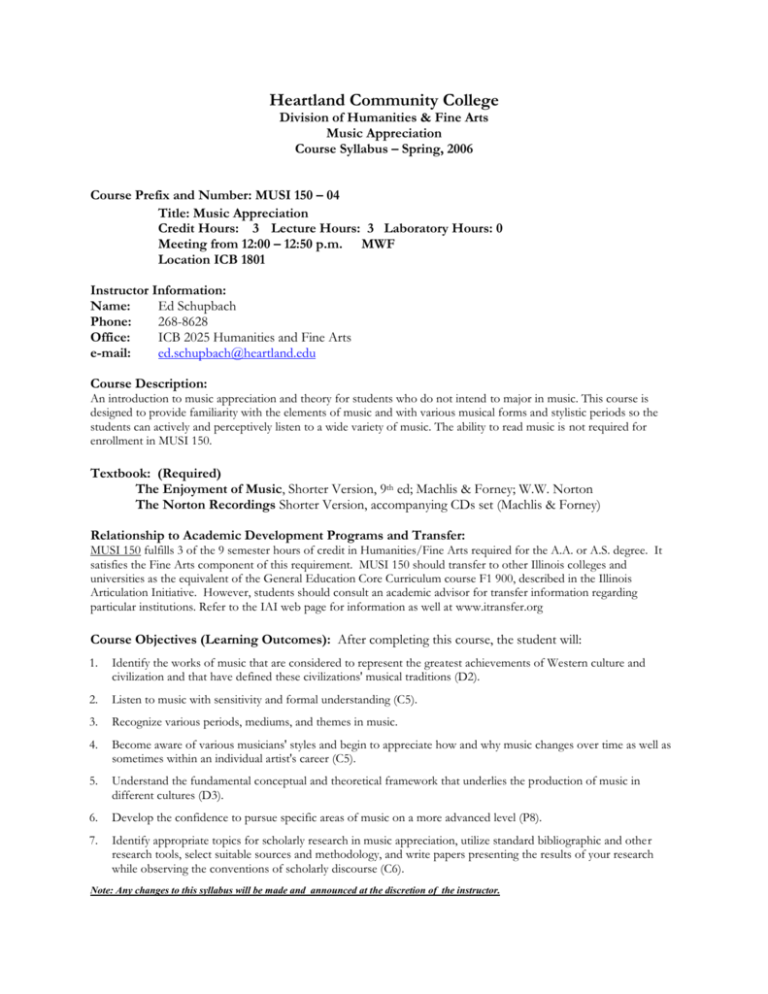
Heartland Community College Division of Humanities & Fine Arts Music Appreciation Course Syllabus – Spring, 2006 Course Prefix and Number: MUSI 150 – 04 Title: Music Appreciation Credit Hours: 3 Lecture Hours: 3 Laboratory Hours: 0 Meeting from 12:00 – 12:50 p.m. MWF Location ICB 1801 Instructor Information: Name: Ed Schupbach Phone: 268-8628 Office: ICB 2025 Humanities and Fine Arts e-mail: ed.schupbach@heartland.edu Course Description: An introduction to music appreciation and theory for students who do not intend to major in music. This course is designed to provide familiarity with the elements of music and with various musical forms and stylistic periods so the students can actively and perceptively listen to a wide variety of music. The ability to read music is not required for enrollment in MUSI 150. Textbook: (Required) The Enjoyment of Music, Shorter Version, 9th ed; Machlis & Forney; W.W. Norton The Norton Recordings Shorter Version, accompanying CDs set (Machlis & Forney) Relationship to Academic Development Programs and Transfer: MUSI 150 fulfills 3 of the 9 semester hours of credit in Humanities/Fine Arts required for the A.A. or A.S. degree. It satisfies the Fine Arts component of this requirement. MUSI 150 should transfer to other Illinois colleges and universities as the equivalent of the General Education Core Curriculum course F1 900, described in the Illinois Articulation Initiative. However, students should consult an academic advisor for transfer information regarding particular institutions. Refer to the IAI web page for information as well at www.itransfer.org Course Objectives (Learning Outcomes): After completing this course, the student will: 1. Identify the works of music that are considered to represent the greatest achievements of Western culture and civilization and that have defined these civilizations' musical traditions (D2). 2. Listen to music with sensitivity and formal understanding (C5). 3. Recognize various periods, mediums, and themes in music. 4. Become aware of various musicians' styles and begin to appreciate how and why music changes over time as well as sometimes within an individual artist's career (C5). 5. Understand the fundamental conceptual and theoretical framework that underlies the production of music in different cultures (D3). 6. Develop the confidence to pursue specific areas of music on a more advanced level (P8). 7. Identify appropriate topics for scholarly research in music appreciation, utilize standard bibliographic and other research tools, select suitable sources and methodology, and write papers presenting the results of your research while observing the conventions of scholarly discourse (C6). Note: Any changes to this syllabus will be made and announced at the discretion of the instructor. Heartland Community College Music Appreciation Syllabus Information – Spring, 2006 Method of Evaluation and Grading Policy: Student assessment will be based on the following factors: 1. Daily class involvement and section quizzes (45 sessions @ 2 pts each/10 quizzes) 100 points a. Attendance at all class sessions is required. b. Participation is the key to your attendance. Your input is valued for the sake of class discussion. c. Your participation in class discussions will be noted each session d. Your participation in class will affect your final grade. 1. Students are responsible for requesting and completing all work that is missed. 2. Any work submitted after its due date will be accepted only with the instructor’s approval. 3. Any class work that fails to be turned in on time will need the approval of the instructor: a. Instructor approval must be gained before it is attempted or completed. b. Late work will be graded in a way that reflects the fact that it was received after due date. e. Quizzes will cover all required reading but will be guided. 1. All quiz materials will be available from the instructor before each weekly quiz. 2. These materials may be obtained from the instructor prior to reading each section. Come to class and be resolved, and be ready to participate! 2. Concert Reports (Two reports @50 points each) … a. Two papers will be submitted as concert reviews. 1. These reports or reviews must reflect the personal attendance of the student. 2. Any supplemental materials from the concerts (programs, etc) may be attached. b. The concerts attended must have the prior approval of the instructor. c. Guidelines and ideas for the report will be discussed in class. 1. Please make note of the information in the text (page 9ff) for ideas. 2. Note the dates that these reports are due, found on the calendar (next page). d. General writing instructions for the format of each report will be handed out in class. e. Concerts may be attended anytime after we have completed the elements of music. 100 points Attend at least two, good concerts, and have fun learning something new! 3. Final Exam… 100 points a. The final exam will be comprehensive, and fully reviewed in class prior to the exam date. b. c. d. All comprehensive final materials require a basic knowledge of the musical eras: be informed! All comprehensive final materials require a basic knowledge of musical forms: be advised! All comprehensive final materials require a basic knowledge of musical composers: be aware! 6. Total points possible upon which grades are computed for this course… 300 points Final grades will be determined according to the following scale: 92 - 100% = A 83 - 91% = B 74 - 82% = C 65 - 73% = D Below 65% = F Students are encouraged to check with the instructor as to their progress and standing in this class. Heartland Community College Music Appreciation Syllabus Information – Spring, 2006 Sunday Jan 15 22 Monday 16 Tuesday 17 Wednesday Thursday 18 Introduction Listening to Music 19 25 26 Friday Saturday 20 21 Listening: Preface – p. 40 23 Listening: Preface – p. 40 24 27 29 30 Pages 71-93 Medieval 31 Feb 1 Pages 71-93 Medieval 2 3 5 6 7 8 9 10 Q Pages 94-125 Renaissance 11 Listening: Pp 41 – 71 Pages 94-125 Renaissance Q 28 Listening Pp 41-71 Pages 94-125 Renaissance Q Pages 71-93 Medieval 4 12 13 Pages 126-159 Baroque 14 15 Pages 126-159 Baroque 16 17 Pages 126-159 Baroque 18 19 20 Pages 126-159 Baroque 21 22 Pages 126-159 Baroque 23 24 Q Pages 126-159 Baroque 25 26 27 Pages 190-208 Classical 28 Mar 1 Pages 190-208 Classical 2 3 Pages 190-208 Classical 4 5 6 1st Report Due Pages 190-208 Classical 7 8 Pages 190-208 Classical 9 10 Q Pages 190-208 Classical 11 12 13 Heartland 14 Community 15 College 16 Spring 17 Break 18 19 20 Pages 209-261 Romantic 21 22 Pages 209-261 Romantic 23 24 Pages 209-261 Romantic 25 26 27 Romantic Pages 262-298 28 29 Romantic Pages 262-298 30 31 Q Romantic Pages 262-298 Apr 1 2 3 Post Romantic Pages 317-353 4 5 Post Romantic Pages 317-353 6 7 Q Post Romantic Pages 317-353 8 9 10 Post Romantic Pages 354-386 11 12 Post Romantic Pages 354-386 13 14 Q Post Romantic Pages 354-386 1 16 17 20TH Century Pages 387-407 18 19 20TH Century Pages 387-407 20 21 Q 20TH Century Pages 387-407 22 23 24 2nd Report due 25 20TH Century Pages 408-457 26 20TH Century Pages 408-457 27 28 Q 20TH Century Pages 408-457 29 30 May 1 New Directions Pages 458 ff 2 3 New Directions Pages 458 ff 4 5 New Directions Pages 458 ff 6 7 8 Final Considerations 9 10 Classes End 11 12 Finals begin 13 Heartland Community College Music Appreciation Syllabus Information – Spring, 2006 Academic Integrity Academic integrity is a fundamental principle of collegial life at Heartland Community College and is essential to the credibility of the College’s educational programs. Moreover, because grading may be competitive, students who misrepresent their academic work violate the right of their fellow students. The College, therefore, views any act of academic dishonest as a serious offense requiring disciplinary measures, including course failure, suspension, and even expulsion from the College. In addition, an act of academic dishonesty may have unforeseen effects far beyond any officially imposed penalties. Violations of academic integrity include, but are not limited to cheating, aiding or suborning cheating or other acts of academic dishonesty, plagiarism, misrepresentation of data, falsification of academic records or documents and unauthorized access to computerized academic or administrative records or systems. Definitions of these violations may be found in the college catalog. Plagiarism Plagiarism is the presenting of others’ ideas as if they were your own. When you write a paper, create a project, do a presentation or create anything original, it is assumed that all the work, except for that which is attributed to another author or creator, is your own. Plagiarism is considered a serious academic offense and may take the following forms: 1 Copying word-for-word from another source and not giving that source credit. 2 Paraphrasing the work of another and not giving that source credit. 3 Adopting a particularly apt phrase as your own. 4 Using an image or a copy of an image without crediting its source. 5 Paraphrasing someone else’s line of thinking in the development of a topic as if it were your own. 6 Receiving excessive help from a friend or elsewhere, or using another project as if it were your own. Note that word-for-word copying is not the only form of plagiarism. The penalties for plagiarism may be severe, ranging from failure on the particular piece of work, failure in the course or expulsion from school in extreme cases. [Adapted from the Modem Language Association’s MLA Handbook for Writers of Research Papers. New York: MLA, 1995: 26] Support Services: Heartland Library Information www.hcc.cc.il.us/library The Library, located within the Academic Support Center (ASC) on the Normal campus, provides Heartland students with a variety of on-campus resources that support both class work and personal inquiry. These include: reference tools (print and non-print), periodicals, audio-visual materials and equipment, reserves, a general circulating collection, and a fiction collection. Computer terminals provide access to various electronic resources, including Academic Universe, FirstSearch, and EbscoHost databases; CARL online card catalog, and Internet access. Several electronic resources are accessible from computers off campus. Students may borrow books from the fiction and general collections and may renew materials, in person or by phone, if requests have not been placed on them. Heartland students also have Interlibrary Loan privileges from Heartland Library. Items usually take 1 to 3 weeks from date of the order to arrive. Heartland Community College Music Appreciation Syllabus Information – Spring, 2006 The Library maintains a quiet study environment. Assistance is available for all library and information needs. Heartland Library is open Monday-Thursday 7:30 a.m. to 9:30 p.m., Friday 7:30 a.m. to 4 p.m., when the college is in session, but is closed on holidays that Heartland observes. Intersession and summer hours are reduced. Milner Library at Illinois State University is a public institution so you may use their collection on site. If you want to request to check out materials, ask for a free Community Borrowers card application at the Milner Library circulation desk. It is important that you have specific titles to request for check out when you apply for the card. The card will give you access to their circulating collection for three months, with a four week check out period. To qualify for this service you must live within 50 miles of Milner, have a current state ID (driver's license) with current address on ID, and be over age 18. After you fill out the application Milner will perform a background check on you for over due books, etc. For more information about Library services please call the Library at 268-8200. Tutoring and Academic Support Heartland Community College offers learning assistance in various forms at no cost to Heartland students at the Academic Support Center (ASC) in Normal and at the Pontiac and Lincoln Centers. Tutors are available at convenient times throughout the week. Study groups, group tutoring facilitated by a specially-trained tutor, are also available by request. Help is also provided through instructional materials, study skills workshops, open computing, and the Library. For more information about services available at each location, please call the ASC in Normal at (309) 268-8235, the Pontiac Center (815) 842-6777; or the Lincoln Center (217) 7351731. Academic Support Services (Academic Support Center) Lab www.hcc.cc.il.us/divisions/asc [The following material must be on every syllabi. However, this text may be updated as needs warranted. Please check either the HCC Intranet site in the Curriculum and Academic Standards folder or with the lead faculty member for the most current site.] Testing Center Lab www.hcc.cc.il.us/divisions/asc/testing The Testing Center proctors make-up exams for students enrolled in traditional courses. In addition, regularly scheduled exams for alternative delivery courses are also proctored at this Center. Exams are proctored free of charge in a secure and quite environment. For more information about exam proctoring services contact the Testing Center at (309) 268-8231. Open Computing Lab www.hcc.cc.il.us/divisions/asc/complab The Open Computing Lab provides free computing for HCC students at convenient times throughout the week. The computer lab is staffed by trained Lab Assistants and offers the use of approximately 70 computers, a scanner, a laser printer, and an electric typewriter.
